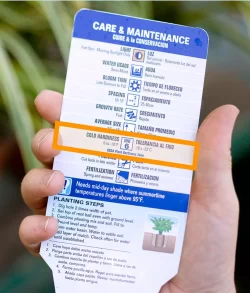Winterproofing plants: Even though Vancouver winters are generally mild, we’ve been hit by a couple of nasty cold snaps in recent years during which life seems to grind to a slippery halt. When the snow starts to fall, most of us aren’t thinking about our gardens, but snow and cold can devastate your plants if they aren’t prepared for it.

Winter-proofing Your Landscapes and Gardens
Winter wreaks havoc on plants that aren’t ready for it. Our plant hardiness zone is a balmy 8B; in short, that means an extremely broad variety of plants can succeed here — especially with proper winterproofing. However, not all of them are equally equipped to handle a sudden, uncharacteristic cold snap. Small plants and perennials might be killed off by prolonged frost and cold. Larger, well-established plants with long limbs or broad leaves can snap or fall over under the weight of ice and snow.

The best practice for guarding your landscape against the ravages of winter is simple: choose the right plants! Scroll down to see a list of plants likely to survive – and even thrive – during unexpected cold weather.
Of course, we don’t always get to choose our plants. Perhaps you’re wrangling a garden that came with your house. Perhaps you’re an avid gardener who craves variety in your landscape, even if that means making some riskier plant choices. Either way, it’s good to be aware of the potential harms brought on by Mother Nature’s coldest days.
Understanding Plant Hardiness Zones When Winter-proofing
First introduced by the U.S. Department of Agriculture, a plant’s “hardiness zone” refers to a loose set of conditions in which a particular plant can survive. A hardiness zone mostly looks at average minimum and maximum temperatures. It does not, however, account for things like topography, age of plant, availability of sunlight, soil composition, drainage, elevation, microclimates, or, most importantly, freak weather events.
 It’s up to you to figure out those details, but if you’re searching for weather tolerant plants, a hardiness zone is a great place to start. If you’re in Greater Vancouver, check the label of the plant you’re buying to determine if it will survive in zone 6-8, but any plant between from zone 3-8 is likely to do okay here. In fact, a plant in a lower hardiness zone (3-5) is much more likely thrive in winter!
It’s up to you to figure out those details, but if you’re searching for weather tolerant plants, a hardiness zone is a great place to start. If you’re in Greater Vancouver, check the label of the plant you’re buying to determine if it will survive in zone 6-8, but any plant between from zone 3-8 is likely to do okay here. In fact, a plant in a lower hardiness zone (3-5) is much more likely thrive in winter!
Remember also: different areas of Metro Vancouver exist in different microclimates. When winterproofing your garden, check your local hardiness zone before making any decisions!
Will Your Plants Survive Winter?
Likely to Survive:
With proper care and research, here are some plants likely to do well through winter’s coldest days. Some of these might even add a nice pop of winter colour to your landscape.
- Hostas
- Red Twig Dogwood
- Cotoneaster
- Coneflower
- Sweet Flag
- Snowdrop
- Heuchera
- Heather
- Winter Daphne
- Pansies
- Primula
- Sedum
- Coral Bark Japanese Maple
- American Wintergreen
- Pampas grass
- Broccoli
- Cabbage
- Leeks
- Some annuals
Unlikely to Survive:
Unless these plants are very well-established or you know how to properly over-winter them, cold weather might kill them.
- Purple fountain grass
- Windmill palms
- Gunnera
- Bougainvillea
- Gaillardia
- Banana tree
- Impatiens
- Marigold
- Coleus
- Tomatoes
- Peppers
- Most types of salvia
- Most annuals
What Else Can You Do?
In addition to selecting plants that are likely to thrive in your hardiness zone, some general gardening practices are helpful for winter-proofing your plants.
Mulching, for example, is the practice of adding a layer of compostable material to your garden beds, such as sawdust, leaves, bark, or compost mulch. When done properly, mulches can look great, and they’ll also keep the ground warm over the winter, suppress unwanted weeds, improve moisture retention, and provide nutrients for plants as they break down.
Good pruning is also immensely helpful when trying to improve your plants chances of winter survival. A plant that has overgrown, thin branches is likely to break or bend in the winter. A perennial that has not been flush-cut in the fall might suffer damage in the cold. Good practices vary from plant to plant, so it’s very important to familiarize yourself with your plants individual needs if you want it to withstand the cold.
How Can We Help?
Need help designing and winter-proofing your garden? We’d love to be involved. Our trained, knowledgeable team can help with winter pruning and plant selection that will help ensure your garden’s survival over the next few tough winters.
Get in touch for a consultation!










Comments are closed here.